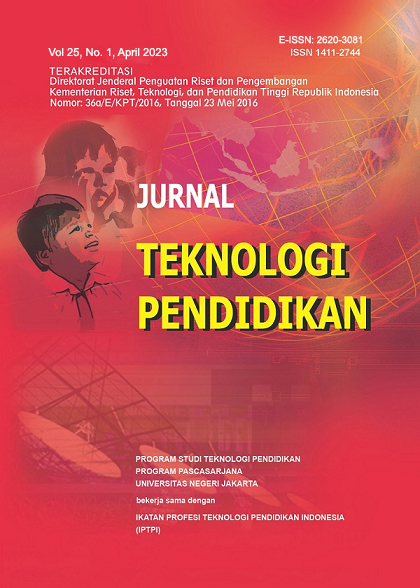Implementation of Adaptive Management To Improve The Quality of Process Standards In Inclusion Schools
DOI:
https://doi.org/10.21009/jtp.v25i1.35339Keywords:
Adaptive Management, Process Standards, Inclusive SchoolsAbstract
Process standards are needed to improve and improve the quality of education. Inclusive schools as educational units are required to use national process standards, so that problems arise in the learning process for students with special needs. In order to provide equitable education services and to carry out effective and efficient learning, inclusive schools must be able to adapt learning to the needs of students with special needs. This study aims to determine the application of adaptive management in improving the quality of the standard process of inclusive schools. This research was conducted at SDIT Al Aufa Bengkulu City. This type of research is qualitative research, the research informants are school principals, deputy principals and teachers, the number of research informants is 31 people taken using a purposive sampling technique. Data collection is done through interviews, observation, and documentation. Data were analyzed using Miles and Huberman's model. The results of the study can be concluded that the implementation of adaptive management to improve the quality of the standard process of SDIT Al Aufa inclusive schools has been implemented properly, which is carried out in 4 forms of activities, namely: 1) lesson planning, 2) learning implementation, 3) learning evaluation, and 4) supervision learning. The process standards implemented at the SDIT Al Aufa inclusive school use national standards for regular students and school standards for students with special needs. It is hoped that inclusive schools will continue to encourage the development of an adaptive management system in every academic and non-academic process.
References
Craig, Robin Kundis, and J. B. Ruhl. 2014. “Designing Administrative Law for Adaptive Management.” Vanderbilt Law Review 67(1): 1–87.
Depdiknas. 2008. “Peraturan Pemerintah RI Nomor 19 Tahun 2005 Tentang Standar Nasional Pendidikan.” Jakarta: Depdiknas.: 2005–8.
Dewi, Desy Eka Citra, Zubaidah Zubaidah, Elfahmi Lubis, and Een Syaputra. 2020. “Problematics of Implementation of Inclusion Education in the Elementary School of Bengkulu City.” International Journal of Multicultural and Multireligious Understanding 7(7): 1.
Fauzi Fahmi. 2021. “Standar Proses Dalam Meningkatkan Mutu Pembelajaran Di Sekolah.” PENDALAS: Jurnal Penelitian Tindakan Kelas dan Pengabdian Masyarakat 1(1): 1–16.
Gunahardi,2018. “Membangun Karakter Bangsa Melalui Pendidikan Inklusi di Sekolah Konferensi Ilmiah Dasar, 8(1), 79-86.
Hamalik Oemar. 2008. Dasar-Dasar Pengembangan Kurikulum. Bandung: Remaja Rosdakarya.
Ikhwan, Wahid Khoirul. 2015. “Implementasi Standar Isi, Standar Proses, Standar Lulusan Sebagai Standar Mutu Pendidikan MTs Negeri Di Kabupaten Tulungagung.” Pedagogia : Jurnal Pendidikan 4(1): 16–22.
Inklusi, Pendidikan, D I Sekolah, Dasar Negeri, and Negeri Giwangan. 2016. “PELAKSANAAN KURIKULUM ADAPTIF DI SEKOLAH PENYELENGGARA.” : 908–17.
Kemendikbud. 2016. “Salinan Permendikbud Nomor 23 Tahun 2016 Tentang Standar Penilaian Pendidikan.” 2016 (Standar Penilaian Pendidikan): 1–12.
Muhari. 2017. “Manajemen Kurikulum dan Pengorganisasian Personalia SD Inklusi di Kecamatan Jonggat Kabupaten Lombok Tengah”. Jurnal Ikmiah Profesi Pendidikan 2(2), Juli – Desember 2017.
Nurjanah, Siti, and Rifqi Muntaqo. 2018. “Manajemen Pembelajaran Berbasis Standar Proses Pendidikan Anak Usia Dini.” Jurnal Penelitian dan Pengabdian Kepada Masyarakat UNSIQ 5(3): 247–58.
Nurwan, Tryas Wardani. 2019. “Implementasi Kebijakan Pendidikan Inklusif Di Sekolah Dasar.” JESS (Journal of Education on Social Science) 3(2): 201.
Oktorima, Orin. 2015. “Penilaian Hasil Belajar Anak Berkebutuhan Khusus Di Sekolah Penyelenggara Inklusif SDN 01 Limau Manis.” E-JUPEKhu 4(3): 340–49.
Prasojo, Lantip Diat, Fredrik Abia Kande, and Amirul Mukminin. 2018. “Evaluasi Pelaksanaan Standar Proses Pendidikan Pada SMP Negeri Di Kabupaten Sleman.” Jurnal Penelitian dan Evaluasi Pendidikan 22(1): 61–69.
Reiman, Teemu, Carl Rollenhagen, Elina Pietikäinen, and Jouko Heikkilä. 2015. “Principles of Adaptive Management in Complex Safety – Critical Organizations.” 71: 2010–12.
Salafsky, Nick, and Richard Margoluis. 2003. “Adaptive Management: An Approach for Evaluating Management Effectiveness.” Paper prepared for VIth IUCN World Parks Congress, Durban. (September): 6.
Saputra, Agus, Fakultas Keguruan, and Muhammad Fahrul Razi. 2022. “Pentingnya Manajemen Layanan Khusus Di Sekolah Bagi Peserta Didik Banjarmasin.” Pentingnya Manajemen Layanan Khusus di Sekolah Bagi Peserta Didik 1: 1–11.
Sugiyono. 2016. Metode Penelitian dan Pengembangan (Research and Development). Bandung: Alfabeta.
Tamansyah. 2017. Pendidikan Inklusi untuk Semuanya. Jakarta: Departemen Pendidikan Nasional.
Taryono, Mandung. 2018. “Strategi Peningkatan Mutu Pendidikan Di SD Negeri Purwodadi Sebagai Sekolah Inklusi.” Media Manajemen Pendidikan 1(2): 177.
UNESCO et al. 2017. “Peraturan Pemerintah Republik Indonesia Nomor 13 Tahun 2020 Tentang Akomodasi Yang Layak Untuk Peserta Didik Penyandang Disabilitas.” European Journal of Special Needs Education 296(243): 1–11.
Williams, Byron K., and Eleanor D. Brown. 2014. “Adaptive Management: From More Talk to Real Action.” Environmental Management 53(2): 465–79.
Zerizghy, Mussie Ghebrebrhan et al. 2009. “No 主観的健康感を中心とした在宅高齢者における 健康関連指標に関する共分散構造分析Title.” American Journal of Research Communication 5(August): 12–42.
Zaini, Syam. 2020. http://metrosulawesi.id/2020/01/28/tantangan-dan- hambatan-pendidikan-inklusi-di-sekolah
Downloads
Published
How to Cite
Issue
Section
License
Jurnal Teknologi Pendidikan is an Open Access Journal. The authors who publish the manuscript in Jurnal Teknologi Pendidikan agree to the following terms.
Attribution-ShareAlike 4.0 International (CC BY-SA 4.0)
-
Attribution — You must give appropriate credit, provide a link to the license, and indicate if changes were made. You may do so in any reasonable manner, but not in any way that suggests the licensor endorses you or your use.
-
ShareAlike — If you remix, transform, or build upon the material, you must distribute your contributions under the same license as the original.
- No additional restrictions — You may not apply legal terms or technological measures that legally restrict others from doing anything the license permits.
Notices:
- You do not have to comply with the license for elements of the material in the public domain or where your use is permitted by an applicable exception or limitation.
- No warranties are given. The license may not give you all of the permissions necessary for your intended use. For example, other rights such as publicity, privacy, or moral rights may limit how you use the material.








